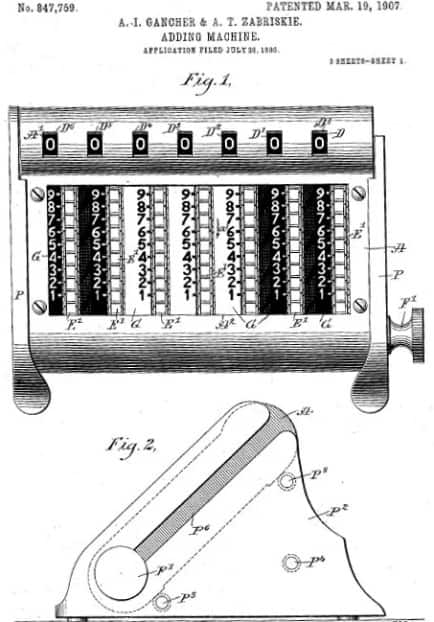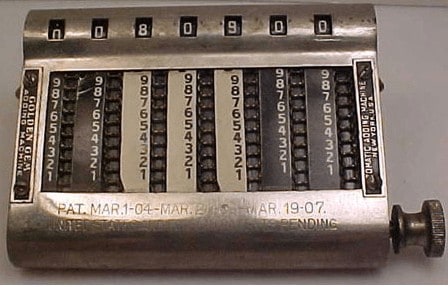The Golden Gem Adding Machine was invented by Russian Jew, Abraham Isaac Gancher. Gancher was a former leather salesman who emigrated to the USA in 1892. The Golden Gem Adding Machine also went by the name of the Gem Adder and the 10-Key Calculator. It was a mechanical calculator which was small and portable. It could be used to complete both addition and subtraction sums, although it was better known for addition.
The Golden Gem Adding Machine worked through the use of a continuous chain which revolved and advanced a number wheel. The wheel then revolved from 0 to 9 to advance the next wheel by one (the tens carrying mechanism).
Quick Facts
- Created
- 1907
- Creator (person)
- Abraham Isaac Gancher
- Original Use
- For addition and subtraction
- Cost
- $10
Golden Gem Adding Machine: History
Otherwise called the Golden Gem, Gem Adder, or the 10-key calculator, the Golden Gem Adding Machine was a portable, small, and easy-to-use mechanical calculator that did both addition and subtraction operations, although specialized in addition.
The moving force behind Golden Gem and Automatic Adding Machine Company was Abraham Isaac Gancher. Born on July 13, 1875, Abraham Isaac Gancher was a Russian Jew who emigrated to the USA in 1892 and initially worked as a leather salesman.
Gancher became interested in adding machines a few years later after marrying the New-York born Rebecca in 1899.
The Golden Gem 10-key calculator was introduced in 1907 by the Automatic Adding Machine Company, New York, and was based on the first similar patent in the USA, taken by Nobyoshi H Kodama (patent №US753586).

Actually, the first patent for this popular chain adder was established in 1899 in Germany (№DE121108) by Heinrich Goldmann alongside that of his Arithmachine. However, because the Jews are a very communicative people, three (3) more patents were issued in the United States and four (4) in Canada, Switzerland, Austria, and England within the next ten (10) years. Interestingly, these patents were granted to different individuals, including Gancher and Albert T. Zabriskie, in 1907 (№847759).
The first commercially available Golden Gem Adding Machine was designed by Abraham Isaac Gancher and manufactured by the Automatic Adding Machine Co., New York, in 1907. The machine sold for $10 per unit after its release; between 1907 and 1917, over 100,000 were already sold.
Golden Gem Adding Machine: How It Worked

The device’s overall size is 6.9 cm x 13 cm x 10 cm, and it was quite heavy, weighing up to 750g.
To operate the 10-key calculator, the stylus is inserted into a link corresponding to the desired number and pulled down. As the continuous chain revolves, it advances a number wheel whose value is seen in the window at the top.
When a wheel revolves from 9 to 0, the tens carry mechanism automatically and advance the next wheel by one. Although this process was efficient, advancing the tens to multiple digits at once, such as from 999 to 1000, required some extra hand strength.
Also, contrary to popular belief, this mechanical calculator also executes subtraction activities, although via the 9s complement method. In this method, red numbers are shown to the right side of each chain. Clearing the result register is achieved by turning the knob at the bottom right until all digits show zero.
Golden Gem Adding Machine: Historical Significance
The mechanical calculator enjoyed a long sales success through the first half of the 20th century.
Before World War II, the Automatic Adding Machine Company of New York tried to launch a portable and printing adding machine based on Gancher’s 1912 and 1916 patents, US1047199 and US1178227, respectively. Originally sold for $50, this machine, however, had no commercial success, and very few of them survived.


